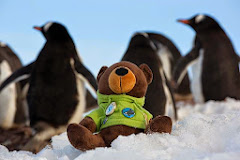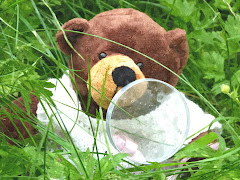Monday 23 December 2013
Merry Christmas
Hi everyone
A merry Christmas from Ed and Bella. I hope you have a great
Christmas, but don’t forget to recycle all that extra packaging that Christmas
brings.
You may need to wait a bit longer for a recycling collection
over Christmas and the New Year. They do a fantastic job and they deserve to
have time off at Christmas too. We would be in a terrible mess without them.
Merry Christmas, Ed and Bella.
Thursday 19 December 2013
Ed the Bear Visits Dirty Beach Exhibition TruCost Super M-Art
Hi all
…and shoes and gloves
While it is possible to imagine that someone might drop the odd water bottle on the beach, the other food containers, tooth brushes etc should not even get anywhere near the sea.
Yesterday I visited the Onca Gallery in Brighton to see an
exhibition called TruCost Super M-Art. The exhibition is laid out as a super market, but not one you will have
been to before. Dirty Beach, a partnership between Brighton-based artist Lou
McCurdy and eco-graffitist Chloe Hanksy, opened a unique
supermarket in London Road, Brighton.
This ‘brand’ new supermarket will only
display discarded plastic items found on UK beaches. The aim of the exhibition
is to draw attention to the increasingly pressing issue of plastic pollution,
waste and consumption using plenty of humour and irony as a powerful way to get
the message across...
Some of the
plastic debris was collected from my own beach at Shoreham, so I was keen to
find out more about it. As you know, I have helped with beach cleans in many parts
of the World from Sussex Beaches to global locations such as Florida and
Hawaiian Island of Kauai. http://adventuresofedthebear.blogspot.co.uk/2013/09/worthing-beach-clean-event-for-marine.html
While
I was in Kauai I saw the Laysan albatross and the many albatross chicks that
die because they are accidentally fed plastic debris by their parents.
I was gifted a scientific
numbered leg band from an Albatross chick, to wear as a necklace, in memory of
the death of albatross chicks in Hawaii.
You can find
out more about the Laysan Albatross and my trip on my weblog at http://adventuresofedthebear.blogspot.co.uk/search/label/Albatross
We do not
have albatross in the UK but we do have a gull-like bird, the fulmar, which
suffers from swallowing plastic debris.
As I went
inside I noticed hanging from the ceiling were banners – like you find in a normal
supermarket . The first thing I noticed was the rows upon rows of plastic
bottles on shelves.
Many were clear drinking bottles but others were blue or different shapes and
probably once held kitchen cleaning chemicals.
Then I turned and looked on
another shelf and there were rows of plastic food containers…
...and
tooth brushes and shavers…
…and shoes and gloves
While it is possible to imagine that someone might drop the odd water bottle on the beach, the other food containers, tooth brushes etc should not even get anywhere near the sea.
While some
animals swallow plastic others become entangled in it. This plastic was removed
from cape fur seals I saw in South Africa.
Divers from the Two Oceans Aquarium
cut this and other plastic from then lucky seals. http://adventuresofedthebear.blogspot.co.uk/2012/01/ed-and-abby-visit-two-oceans-aquarium.html
There were
rows of disposable lighters and gun cartridges, many of these came from
Shoreham Beach. As I have seen on my travels, one way that plastic debris can
get into the ocean is via rivers.
The shot gun cartridges probably ended up on
Shoreham Beach from the river Adur after being washed down from further up
river. Many towns and villages were originally built by rivers because of the
need for either drinking water (for humans and livestock) or as a means of
travel and transportation. In modern times, the towns have grown and many
people now live near rivers and plastic and other litter is frequently dropped
or blown into rivers.
I have been
lucky to have travelled to the Hawaiian Islands 3 times now and I have learned
to speak a bit of the Hawaiian Language. One of the words they taught me was Kuleana pronounced koo-l-eh-ah-n-ah.
Kuleana ,means responsibility. Supermarkets
(and all shops) have Kuleana for everything they sell and its possible impact on the environment.
But we all have Kuleana as
well for everything we
buy and how we dispose of it and where possible reusing or recycling it.
One of the
things used to make plastic is oil, which is a natural resource which is
running out. So recycling and reusing plastic will help conserve the oil that
is left. I have visited USA
on many occasions. I found out that in America people buy more bottled water
than any other nation in the world.
This adds 29 billion water bottles a year
to the problem. To make these bottles, manufacturers use 17 million barrels of
crude oil. That’s enough oil to keep a million cars going for twelve months. Imagine
a water bottle filled a quarter of the way up with oil. That’s about how much
oil was needed to produce the bottle.
It often
takes less energy to recycle something than to create it new – so it can save
energy and reduce the impact of its production on the environment. Recycling one plastic bottle can save
enough energy to power a 60-watt light bulb for six hours.
As Bella
will tell you http://seawatch17.wix.com/bella-world-of-water
it also takes a lot of water to make
plastic about 1.39 litres of water to make a single 1
litre bottle of water. But if you look at the whole supply chain from drilling
for oil to transporting the finished bottle to the store-even more water is
used. By recycling you will be doing more than just stopping plastic getting
into to the ocean.
I also saw some of Lou McCurdy's fascinating beach art
There is still time to go along to see the
exhibition, it ends on 22nd December.
If you can’t visit the exhibition, then
please share this message. Think carefully about packaging when you are
shopping, reuse what you can and recycle things you can’t reuse. Remember, we
all have Kuleana
Subscribe to:
Posts (Atom)








